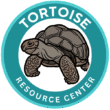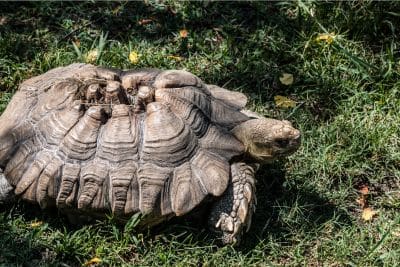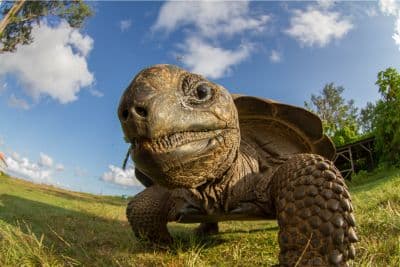Stress in tortoises typically manifests itself either as a behavioral or physical response, and as I shall explain, can be caused for a variety of reasons.
For owners and keepers. It’s important to recognize the signs as early as possible to avoid prolonged stress which can be detrimental to a tortoise’s health and well-being.
In this article I’ll be covering what I’ve learned about tortoise stress in my years of keeping them, providing you with the knowledge needed to keep your tortoise happy and healthy.
Causes of Stress in Tortoises
Stress can impact many elements of a tortoises physical and mental health. In fact, it can compromise their immune function, digestive health, behavior, reproductive success, as well as their overall well-being.
As a keeper, you can minimize unnecessary stress for your tortoise by providing a consistent routine and stability. Alterations to their surroundings, both inside and immediately outside their enclosure can disrupt their sense of security.
For example, cramped enclosures or sharing spaces with other animals can disrupt their otherwise solitary tendencies. Similarly, exposure to predators such as pets, wildlife or unfamiliar humans can trigger stress responses.
In terms of their environmental conditions, tortoises are ectotherms, meaning they rely on external heat sources to regulate their body temperature.
Captive tortoise enclosures should have a warm and a cool side because inadequate temperatures or fluctuations can disrupt their thermoregulatory behaviors and lead to stress.
Although their specific humidity requirements depend on the species, they all rely on air moisture to aid hydration and respiratory function. Any abrupt spikes in moisture content can affect normal functions and initiate a stress response.
Perhaps most importantly, tortoises need UV light either from the sun or artificial light and a lack of will cause physical issues and the potential onset of stress.
UVB enables them to synthesize Vitamin D3. Without it they are unable to absorb the calcium needed to keep their bones and shell strong and healthy.
UVA absorption means they can maintain their circadian rhythm and perform normal tasks including eating, sleeping, and mobilizing.
Signs To Look Out For
Tortoises may not be the most adept at communicating, but there are some key signs to look out for that can indicate distress.
Behavioral Changes
- Major decrease in food consumption or stopping eating altogether.
- Reduction in activity and displaying signs of lethargy or weakness.
- Repetitive behaviors such as pacing or rubbing their head on the ground.
Physical Symptoms
- Fecal abnormalities.
- Soft or damaged shell.
- Skin abrasions or discoloration.
- Heavy and irregular breathing.
- Abnormal postures or movements.
Diagnosing Stress
If your tortoise is displaying symptoms of stress, it’s possible you may be able to figure out the cause for yourself. Ask yourself the following questions:
- Are they receiving adequate UBV lighting?
- For indoor tortoises, does the UV bulb need changing?
- Has the temperature or humidity recently fluctuated?
- Have you moved things around their enclosure?
- Have you changed their diet?
- Have you introduced a new pet or tortoise companion?
Once you have figured out what the issue could be and rectified it, closely monitor your tortoise for improvement.
However, if the stress symptoms persist, or you are unsure about the underlying cause, its best to consult a veterinarian who will perform a thorough examination to diagnose underlying issues and recommend management advice.
Tools and Methods for Monitoring Stress
Pay close attention to your tortoises’ behavior and identify any factors that may indicate stress, such as changes in feeding or activity levels.
Conduct periodic, physical examinations to assess their overall health and conditions. Look for physical symptoms including weight loss, shell abnormalities and skin abrasions.
Since tortoises are sensitive to environmental changes and require specific conditions, I find that installing a combined thermometer and humidity gauge in their enclosure helps me to maintain optimum environmental conditions. It’s best to have one in the cooler area and another in the basking area due to the temperatures differences in both zones.
Are You Starving Your Tortoise?
Save 10% on premium tortoise food and supplements from Tortoise Resource Center on Amazon now using code BUYNOWGET10
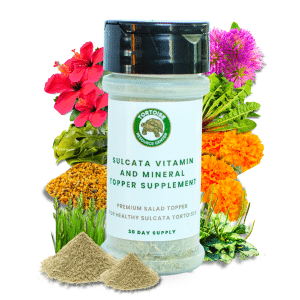
Sulcata Vitamin & Mineral Topper Supplement
30-Day Supply | 2 oz (56 g)
$24.99
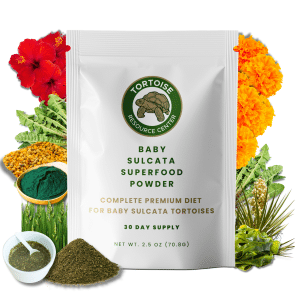
Baby Sulcata Tortoise Superfood Powder
30-Day Supply | 2.5 oz (70.8 g) Bag
$24.99
Managing and Reducing Stress
Stress in tortoises can be managed, reduced, and even eliminated if owners adhere to the specific environmental conditions for their tortoise species, implement proper husbandry practices for diet and cleaning, and address any underlying causes of stress.
Improving Habitat Conditions
The ideal tortoise habitat mimics the conditions they would experience in the wild. Their enclosure needs a temperature gradient to allow them to control their body temperature.
Use my care guides to research the specific heat, light and humidity requirements for your tortoise as optimum levels depend on the species. For example, tortoises from arid regions such as Greek tortoises favor lower humidity levels whilst those from humid environments such as Sulcatas prefer moist air.
For indoor enclosures use heat lamps to create warmer, basking areas and provide cool, shaded retreats. Make sure you provide your tortoise with a UVB light to support vitamin D synthesis and calcium metabolism.
Ensure your tortoise has adequate space. The enclosure should be big enough to accommodate exploring, hiding, feeding and basking.
It’s imperative that your tortoise is exposed to plenty of enrichment such as vegetation, rocks, and shelter, as boredom can lead to stress. Provide your tortoise with spaces to hide and burrow, use a variety of suitable substrates, introduce climbing areas and toys they can explore.
Dietary Considerations
Tortoises require a high-fiber, low-sugar and low-protein diet. vitamins and minerals. I recommend feeding your tortoise a variety of dark, leafy green vegetables, edible flowers and grasses that are all loaded with vitamins and minerals.
I’m a firm believer in dietary supplements too. Calcium powders that you can sprinkle on their food, especially in the winter, will contribute to maintaining bodily functions and good health.
Additionally, hydration is very important for tortoises, especially after hibernation. Make sure you tortoise has constant access to clean, drinking water and a shallow bathing area.
Preventing Stress
The best way to ensure the health, happiness and well-being of your tortoise is prevent them from ever being stressed. This can be easily achieved through creating an environment that is conducive with their natural habitat, establishing a consistent care routine, and identifying potential stressors.
Tortoises are creatures of habit, so I recommend avoiding drastic, environmental changes. I suggest adopting a routine in terms of enclosure cleaning, regular feeding times, providing enrichment and carrying out check-ups.
As a tortoise owner, it’s your responsibly to ensure your tortoise is happy and healthy. I advise giving your tortoise a visual examination monthly. Weigh your tortoise and check for visual abnormalities and signs of stress.
I also recommend taking your tortoise to the vet at least once a year, so they can carry out a thorough examination.
References
- The Veterinary Nurse – Stress in chelonians
- Wiley Online Library – Immune stress and physiology
- Long Island Bird and Exotics Veterinary Clinic – Tortoise care
